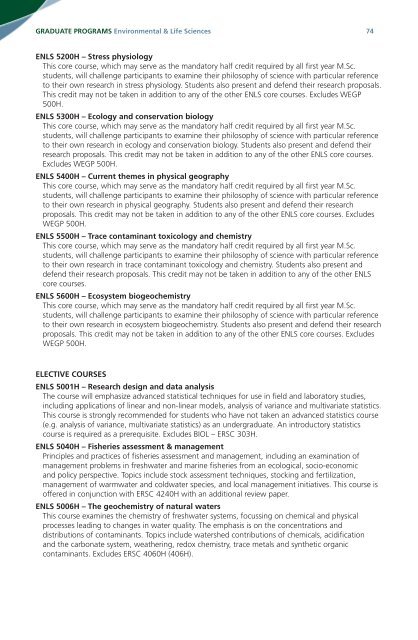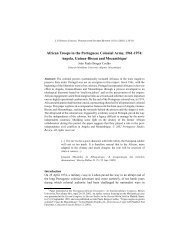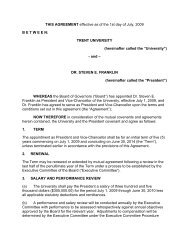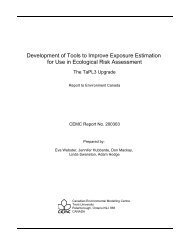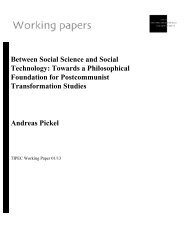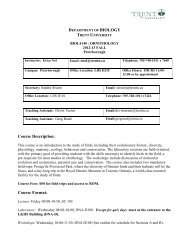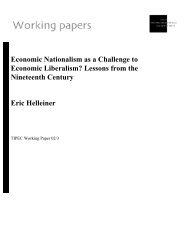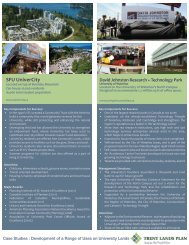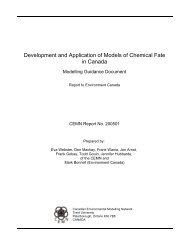Graduate academic calendar 2012 - 2013 - Trent University
Graduate academic calendar 2012 - 2013 - Trent University
Graduate academic calendar 2012 - 2013 - Trent University
Create successful ePaper yourself
Turn your PDF publications into a flip-book with our unique Google optimized e-Paper software.
GRADUATE PROGRAMS Environmental & Life Sciences<br />
74<br />
ENLS 5200H – Stress physiology<br />
This core course, which may serve as the mandatory half credit required by all first year M.Sc.<br />
students, will challenge participants to examine their philosophy of science with particular reference<br />
to their own research in stress physiology. Students also present and defend their research proposals.<br />
This credit may not be taken in addition to any of the other ENLS core courses. Excludes WEGP<br />
500H.<br />
ENLS 5300H – Ecology and conservation biology<br />
This core course, which may serve as the mandatory half credit required by all first year M.Sc.<br />
students, will challenge participants to examine their philosophy of science with particular reference<br />
to their own research in ecology and conservation biology. Students also present and defend their<br />
research proposals. This credit may not be taken in addition to any of the other ENLS core courses.<br />
Excludes WEGP 500H.<br />
ENLS 5400H – Current themes in physical geography<br />
This core course, which may serve as the mandatory half credit required by all first year M.Sc.<br />
students, will challenge participants to examine their philosophy of science with particular reference<br />
to their own research in physical geography. Students also present and defend their research<br />
proposals. This credit may not be taken in addition to any of the other ENLS core courses. Excludes<br />
WEGP 500H.<br />
ENLS 5500H – Trace contaminant toxicology and chemistry<br />
This core course, which may serve as the mandatory half credit required by all first year M.Sc.<br />
students, will challenge participants to examine their philosophy of science with particular reference<br />
to their own research in trace contaminant toxicology and chemistry. Students also present and<br />
defend their research proposals. This credit may not be taken in addition to any of the other ENLS<br />
core courses.<br />
ENLS 5600H – Ecosystem biogeochemistry<br />
This core course, which may serve as the mandatory half credit required by all first year M.Sc.<br />
students, will challenge participants to examine their philosophy of science with particular reference<br />
to their own research in ecosystem biogeochemistry. Students also present and defend their research<br />
proposals. This credit may not be taken in addition to any of the other ENLS core courses. Excludes<br />
WEGP 500H.<br />
ELECTIVE COURSES<br />
ENLS 5001H – Research design and data analysis<br />
The course will emphasize advanced statistical techniques for use in field and laboratory studies,<br />
including applications of linear and non-linear models, analysis of variance and multivariate statistics.<br />
This course is strongly recommended for students who have not taken an advanced statistics course<br />
(e.g. analysis of variance, multivariate statistics) as an undergraduate. An introductory statistics<br />
course is required as a prerequisite. Excludes BIOL – ERSC 303H.<br />
ENLS 5040H – Fisheries assessment & management<br />
Principles and practices of fisheries assessment and management, including an examination of<br />
management problems in freshwater and marine fisheries from an ecological, socio-economic<br />
and policy perspective. Topics include stock assessment techniques, stocking and fertilization,<br />
management of warmwater and coldwater species, and local management initiatives. This course is<br />
offered in conjunction with ERSC 4240H with an additional review paper.<br />
ENLS 5006H – The geochemistry of natural waters<br />
This course examines the chemistry of freshwater systems, focussing on chemical and physical<br />
processes leading to changes in water quality. The emphasis is on the concentrations and<br />
distributions of contaminants. Topics include watershed contributions of chemicals, acidification<br />
and the carbonate system, weathering, redox chemistry, trace metals and synthetic organic<br />
contaminants. Excludes ERSC 4060H (406H).


